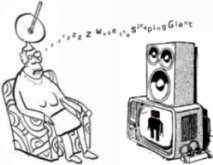 Between Zizek’s eight-page introduction and his 144-page Afterword are the pages of Vladimir Lenin’s most important writings from 1917, the radical kernel from which the meaning of Zizek’s project is derived.
Between Zizek’s eight-page introduction and his 144-page Afterword are the pages of Vladimir Lenin’s most important writings from 1917, the radical kernel from which the meaning of Zizek’s project is derived.The situation that confronted Lenin and the Bolsheviks a hundred years ago, in which they are faced with a dilemma between political options that actually do nothing more than an attempt to reduce the working-class struggle to reform politics, is in fact the same situation that challenges the left of today: between postmodernism and liberal culturalism, the left is locked between these two dominant discourses which appears as the only opposed alternatives but really constitute as a strategy of the capitalist system. Instead of consenting to the prevailing choices, Lenin rejected and redefined the very meaning of these choices and opened the “third term” from which the working class can truly assert their struggle. This formula from Lenin's "What is to be done?" is the same formula Zizek resurrects, which is aimed to the contemporary opportunists and those who disguise themselves as Marxists. After the demise of the Socialist regimes in 1989, the Third Way discourse emerged in response to it. This theory insists that we
 have approached the "end of history and ideology" and, thus, the end of class struggle, and that the socialist imaginaries can no longer be pushed forward. No more ideologies; no more proletarians. Hence, the left is reduced in a dilemma: either to assert the old socialist ideology or to accept capitalism as "the only game in town." Those previous left who accepted the latter turned into conservative Third Way theorists, or what Zizek calls "the knaves"; the other reds who still assert their "progressiveness," are the so-called "fools", the partisans advancing postmodern political subjectivities – race, class, ethnicity, ecology, etc. Though the latter performs their particular resistances, they actually bear no threat to the whole capitalist system. Their critique of the system only strengthens its ruling discourse preached by the knaves. Hence, in reality, these two figures serve as supplements of the existing order.
have approached the "end of history and ideology" and, thus, the end of class struggle, and that the socialist imaginaries can no longer be pushed forward. No more ideologies; no more proletarians. Hence, the left is reduced in a dilemma: either to assert the old socialist ideology or to accept capitalism as "the only game in town." Those previous left who accepted the latter turned into conservative Third Way theorists, or what Zizek calls "the knaves"; the other reds who still assert their "progressiveness," are the so-called "fools", the partisans advancing postmodern political subjectivities – race, class, ethnicity, ecology, etc. Though the latter performs their particular resistances, they actually bear no threat to the whole capitalist system. Their critique of the system only strengthens its ruling discourse preached by the knaves. Hence, in reality, these two figures serve as supplements of the existing order.In this post-political era of society, the sphere of the economy is depoliticized, naturalizing class antagonism, and translating it to tolerance of differences instead, the ethical gesture of respecting the right of others to their specific enjoyments. Other domains formerly considered as non-political become politicized. Analysis shifted from class politics to identity politics; struggles changed from ideological to cultural. However, in the series of particular contradictions, class antagonism remains as the structuring principle that allows other series of struggles to be articulated. It is not one among the chain of equivalences. All other particular struggles in the series will always refer to class. These are the partial resistances that capitalism tolerates. The real contradiction is always located through the horizon of class which carries the real threat to the capitalist system.
This celebrated “end of history and ideology” and the emergence of contingent postpolitics are what Zizek asserts as leading to the “prohibition on thinking” or “Denkverbot”, that any attempt to overcome the existing order will only let the things end up worse and create a new Gulag. One should challenge this by inverting Wittgenstein from “What one cannot speak about, thereof one cannot remain silent” to “what one should not speak about, thereof, one cannot remain silent.”
Instead of giving in to the temptation of false choices which appears as a deadlock between seemingly antagonistic options, in order to formulate a real political alternative, it is necessary to “think outside the box,” to find the “third element,” to take the most radical gesture of authentic Act, i.e. repeat Lenin’s gesture of redefining the very field through which perceived choices are grounded. It is this spirit of Lenin which continues to speak to the left today, which when performed will challenge the established social relations and disturb the phantasmic core, the doxa of the whole capitalist order. The terrain for class struggle remains open to assert its universality.

